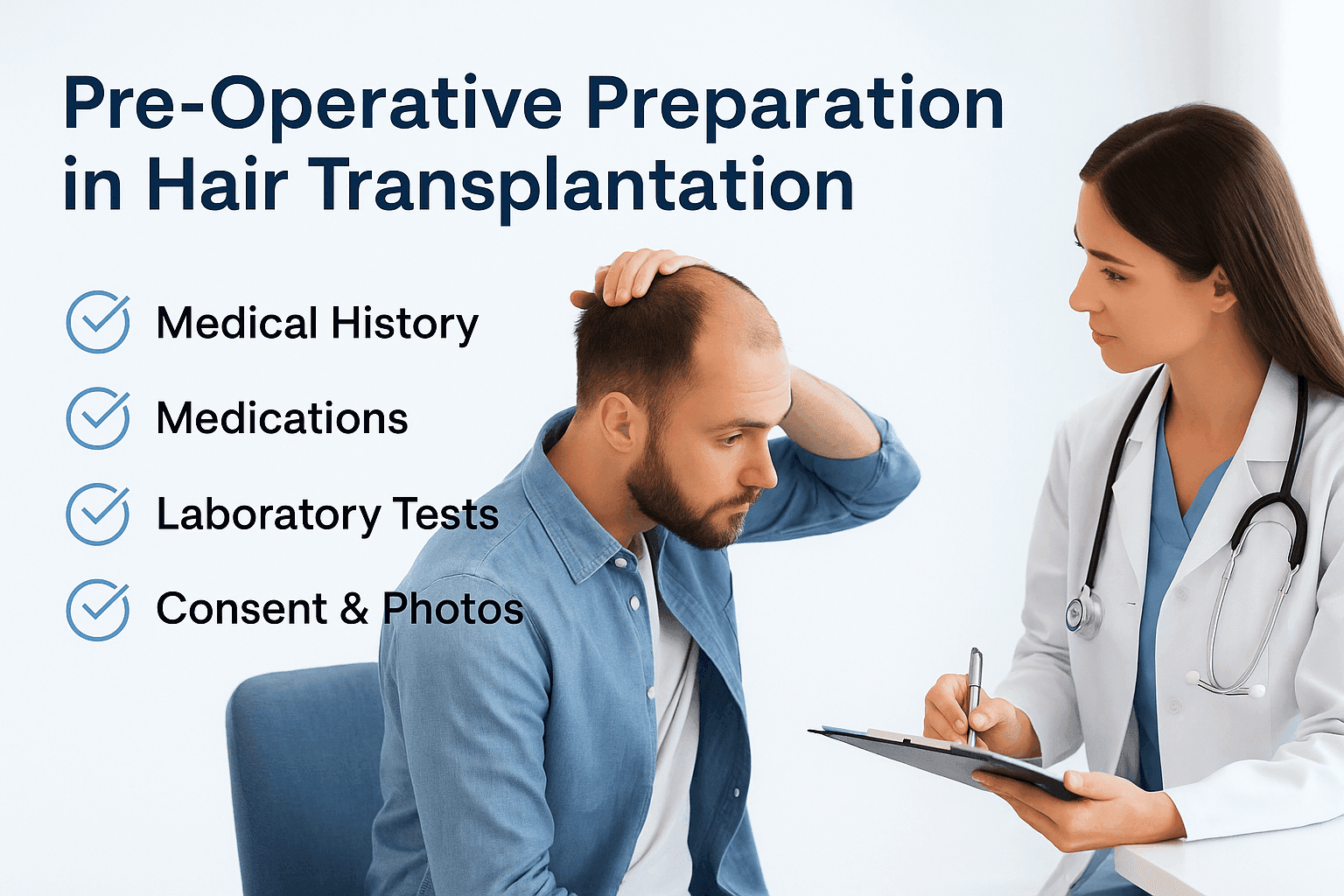Pre-Operative Preparation in Hair Transplantation: A Comprehensive Guide
Pre-operative preparation in hair transplantation is essential for minimizing risks and achieving optimal results.
By assessing medical history, medications, lifestyle factors, and laboratory tests in a structured way, clinicians can tailor the procedure
and significantly improve outcomes. Below is a practical, step-by-step checklist you can follow before your surgery.

Identity & System Evaluation
Begin with a standardized patient information form and identity verification. Document age, contact details, past procedures, and systemic comorbidities:
- Cardiovascular: hypertension, ischemic disease, arrhythmia, anticoagulant use
- Respiratory: asthma, COPD, sleep apnea
- Endocrine & metabolic: diabetes, thyroid disorders, dyslipidemia
- Hepatic/renal function, bleeding history, prior anesthesia reactions
- Infection risks: hepatitis B/C, HIV, herpes, active dermatologic infections
This systemic review informs anesthesia planning and peri-operative risk reduction.
Medication, Habits & Allergy Assessment
Review prescription drugs, OTC products, and supplements that may increase bleeding or impair healing. Typical recommendations include:
- Stop NSAIDs, aspirin (unless cardiologist advises otherwise), high-dose omega-3, vitamin E, garlic, ginkgo ~7–10 days pre-op
- Limit alcohol for at least 72 hours pre-op; avoid recreational drugs
- Smoking cessation ideally 2 weeks before and after the procedure
- Record allergies to local anesthetics, antibiotics, antiseptics, or adhesives
Physical Exam & Laboratory Tests
Conduct focused physical examination with vitals and airway assessment. Consider baseline labs when clinically indicated to optimize safety:
- Complete blood count and coagulation profile (PT/INR, aPTT) when risk factors exist
- Fasting glucose/HbA1c for diabetic or high-risk patients
- Hepatitis markers when relevant to institutional protocol
Combine exam and labs with trichologic evaluation (donor density, caliber, miniaturization) to define a realistic graft plan.
Consent, Photography & Documentation
Provide verbal and written information about benefits, alternatives, and risks (bleeding, infection, shock loss, scarring, graft survival variability).
Obtain signed informed consent and capture standardized photographs (frontal, oblique, profile, vertex) under consistent lighting and distance.
Align expectations with a clear density plan and post-op timeline.
Patient Instructions Before Surgery
- Shampoo the scalp the night before and morning of surgery; avoid styling products
- Arrive with comfortable clothing (front-zip hoodie/shirt) to avoid friction on grafts
- Arrange transportation; avoid driving after long sessions or sedation
- Have post-op kit ready: saline spray, prescribed meds, travel pillow, loose cap/hat
For general surgical preparation principles, see the American Academy of Dermatology’s guidance.
-Scalp Care Before Surgery
Proper scalp care before a hair transplant enhances the healing process and improves graft survival. Patients are advised to use mild, sulfate-free shampoos for at least a week before surgery. Avoid hair dyes, harsh styling products, and excessive sun exposure, as these can irritate the scalp and affect the condition of the donor area. In some cases, your surgeon may recommend using topical antiseptics the night before surgery to reduce bacterial load.
-Nutrition and Hydration
A balanced diet rich in proteins, vitamins (especially biotin, vitamin C, and vitamin D), and minerals like zinc and iron supports tissue repair and hair growth. Staying well-hydrated in the days leading up to the procedure can also improve circulation and recovery. Patients should avoid fasting unless medically required, as low blood sugar can affect comfort during the procedure.
-Mental Preparation and Realistic Expectations
Pre-operative preparation in hair transplantation is not only physical but also psychological. Understanding that transplanted hair grows gradually over 9–12 months helps reduce anxiety. Reviewing before-and-after photos of previous patients and discussing realistic density goals with your surgeon ensures alignment between your expectations and achievable results.
Plan Your Pre-Op Consultation
Thorough pre-operative preparation in hair transplantation lays the foundation for safe anesthesia, efficient grafting,
and natural results. Ready for a personalized plan?
Frequently Asked Questions
-When should I stop blood-thinning products?
Many supplements and NSAIDs should be paused about 7–10 days prior, unless your physician advises otherwise. Always follow individualized medical guidance.
-Do I need lab tests before a hair transplant?
Labs are ordered based on risk factors and institutional protocol. Your clinician will decide which tests are needed for safety.
-Why are standardized photos important?
Consistent photography allows objective tracking of growth and density, and improves patient-clinician communication.



